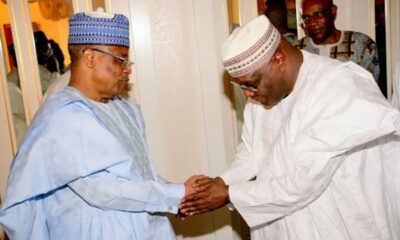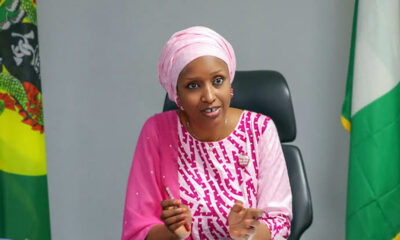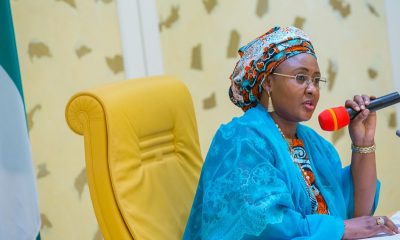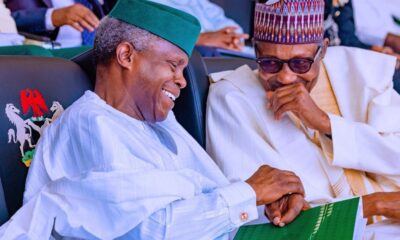metro
IBB reveals why they toppled Buhari govt
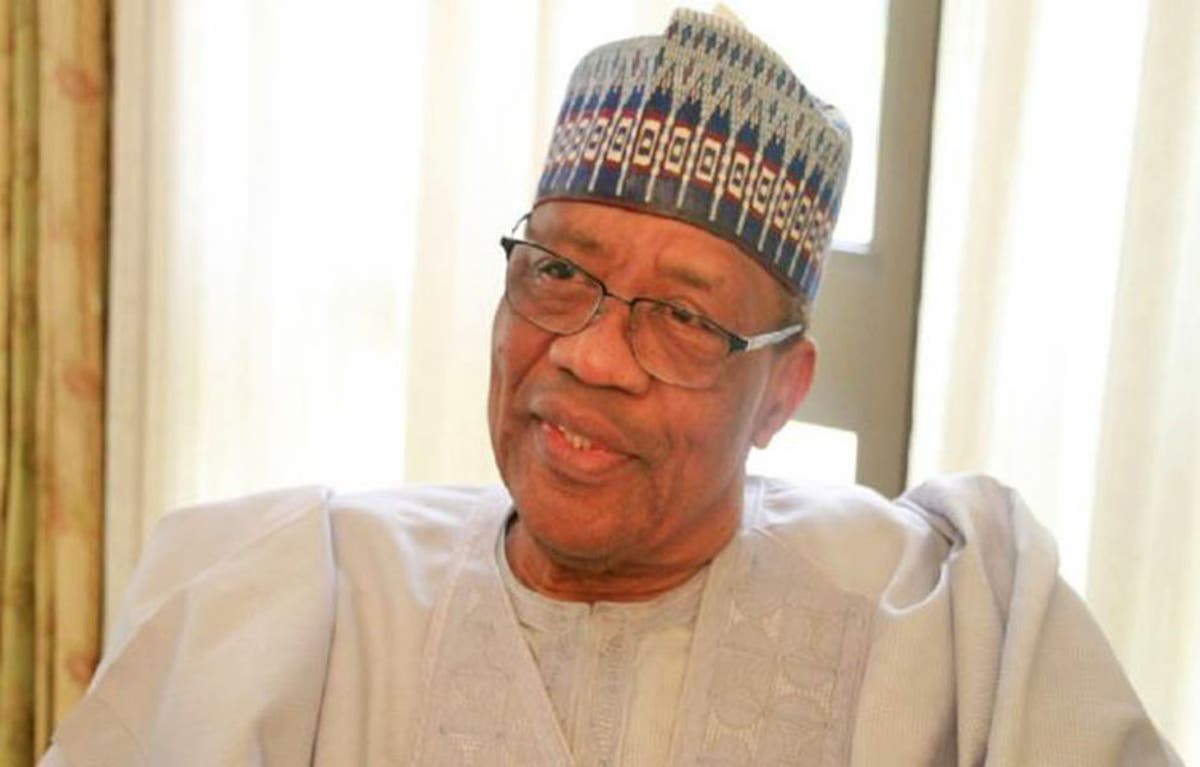
IBB reveals why they toppled Buhari govt
Former Military President General Ibrahim Badamasi Babangida (rtd) has explained the reasons for the overthrow of General Muhammadu Buhari’s regime in 1985 as well as the subsequent drastic economic reforms, including the devaluation of the naira.
Babangida, who served as the Chief of Army Staff under Buhari and played a key role in the 1983 coup that brought him to power, provided a detailed account of the events in his autobiography, A Journey in Service.
The 420-page book, released on Thursday, has sparked controversy, particularly regarding key issues that shaped Babangida’s eight-year rule, including the annulment of the June 12 presidential election; the assassination of foremost journalist, Dele Giwa; and the execution of Major General Mamman Vatsa over an alleged coup plot.
‘The 1985 coup was a necessary intervention’
In Chapter Six, titled Mounting the Saddle, Defining a Military Presidency, Babangida justified the 1985 coup, describing it as a response to national discontent and the deteriorating state of affairs.
“By the beginning of 1985, the citizenry had become apprehensive about the future of our country. The atmosphere was precarious and fraught with ominous signs of clear and present danger. It was clear to the more discerning leadership of the armed forces that our initial rescue mission of 1983 had largely miscarried,” he wrote.
He argued that failure to act would have led to a split within the armed forces, which he believed would have had disastrous consequences for the country.
READ ALSO:
- Yahaya Bello: Sowore clashes with security operatives at Abuja court
- S’West govs can’t stop Shariah panels – Kwara judge
- EFCC presents witnesses against Yahaya Bello in N80.2bn fraud case
“If the armed forces imploded, the nation would go with it, and the end was just too frightening to contemplate,” he stated.
He noted that while the military had initially taken over in 1983 with a shared sense of purpose, divisions had begun to emerge within the ranks.
“In state affairs, the armed forces, as the only remaining institution of national cohesion, were becoming torn into factions; something needed to be done lest we lose the nation itself. My greatest fear was that division of opinion and views within the armed forces could lead to factionalisation in the military. If allowed to continue and gain root, grave dangers lay ahead,” Babangida added.
He accused Buhari and his deputy, Brigadier General Tunde Idiagbon, of isolating themselves from the military establishment and adopting a rigid, authoritarian approach to governance.
“They both posited a ‘holier than thou’ attitude, antagonising the civil populace against the military. Fundamental rights and freedoms were being routinely infringed upon and abused,” Babangida wrote.
According to him, the Buhari administration ruled by fear rather than foster trust and hope among the people.
“We were supposed to improve their lives and imbue the people with hope for a better future. Instead, we ruled the nation with a series of draconian decrees. An administration intended to reflect the collective will of the armed forces as a national institution came to be seen as the private personal autocracy of a stubborn few,” he wrote.
‘Buhari’s resort to ancient barter trade system worsened economic hardship’
Babangida also cited worsening economic conditions and public dissatisfaction as factors that made the coup inevitable.
Draconian decrees, he said, had severely restricted individual freedoms, while justice was often mechanical and harsh.
“Punishment for crimes against the state had led to the pursuit of mechanical legalistic justice against the dictates of natural justice,” he noted.
As Chief of Army Staff, Babangida said he was under pressure from junior officers to take action to prevent further erosion of the military’s credibility.
READ ALSO:
- Emefiele demands judge’s recusal over bias claims
- Tanker drivers threaten strike to protest incessant extortion
- Zelenskyy’s rudeness to Trump may end Ukraine-US relations
“On several occasions and instances, even the very integrity of the armed forces was being called into question,” he wrote.
He described how disciplinary actions were taken against senior officers without due process, which led him to consider resigning.
“A disciplinary case involving allegations of divided interest against some senior officers was decided without due recourse to the Army Council. Instead of waiting for a report and investigation from the Army leadership, the affected officers were unceremoniously relieved of their commission, and their military career of so many years was abruptly ended without any input from the Army as their institution of origin. I objected to this arbitrariness and disregard for due process,” he wrote.
His decision to oppose these actions, he said, led to him being placed under surveillance “with the privacy of my communications and those of my family constantly monitored.”
“This tense atmosphere culminated in the unanimous decision of a broad spectrum of senior and middle-level officers to change the nation’s leadership. The processes associated with this change were completed without bloodshed by midnight on August 26, 1985,” Babangida stated.
A Washington Post report on August 27, 1985, quoted Babangida as saying that the Buhari government had been “too rigid and uncompromising,” had failed to end “economic mismanagement,” and had caused “intolerable suffering.”
Why we devalued the Naira
One of the most controversial decisions of Babangida’s regime was the devaluation of the naira. In Chapter Seven, titled Reforming the Economy: Privatisation, IMF, SAP, and other Matters, he explained why his government implemented this policy.
Babangida argued that the Buhari administration’s approach of setting an artificial exchange rate had severely distorted the economy.
“The primary cause of the crisis in the economy itself was a total mismatch of supply and demand. The shortage in the supply of essential goods was occasioned by uncertain access to foreign exchange,” he wrote.
He criticised Buhari’s policy of fixing the exchange rate at a subsidised level, saying it created unnecessary bureaucratic hurdles for businesses and individuals.
“Importers, manufacturers, government goods and services, and the general public could only access foreign exchange through the red tape of a bureaucracy that needed to be more transparent,” he wrote.
He also criticised Buhari’s crackdown on individuals carrying foreign currency, referencing the arrests of musician Fela Kuti and businessman Chief Harold Shodipo.
“I must confess that I felt assaulted and hurt that my predecessor had arrested, detained and harassed some prominent Nigerians because they were found at the airport travelling with a few dollars or pounds sterling,” he wrote.
According to him, his government needed to “quickly remove the government from the role of an enormous money changer to that of an enabler of the appropriate economic environment.”
READ ALSO:
- Tinubu’s message forced some people to congratulate me on 65th birthday – El-Rufai
- Military closing in on bandit kingpin, Bello Turji, arrests his arms supplier
To address these challenges, Babangida’s administration introduced a deregulated foreign exchange market.
“We decided to deregulate the foreign exchange market by floating the exchange rate instead of fixing it at a predetermined level by government fiat,” he explained.
Although the naira weakened in value, Babangida maintained that the policy allowed for a more realistic exchange rate based on market forces.
“We were satisfied that the demand and supply of foreign exchange determined the exchange rate. At least foreign exchange stopped being a deity to be worshipped by all and sundry since it could now be accessed more liberally,” he wrote.
IBB justifies privatisation and economic liberalisation
Babangida also defended his government’s decision to privatise state-owned enterprises, arguing that excessive government control had stifled economic growth.
“On a macroeconomic level, we needed to free the commanding heights of economic activity from the stranglehold of government so that competition among players could engender a more excellent supply of goods and services among competitive players,” he wrote.
He noted that government-run enterprises had become “massive drains on the economy” and were not profitable.
“If we could free the economy from excessive regulation and government control, the economy would operate more efficiently,” he argued.
Babangida said his administration believed Nigerians would prefer to pay higher prices for goods rather than face persistent shortages and long queues.
“Our perception of the familiar feeling among most Nigerians was that they would prefer to pay a little more for essential goods and services and be spared the humiliation of endless queues and incurable scarcity,” he wrote.
By liberalising access to foreign exchange and reducing government control, Babangida said his administration ended commodity shortages and queues.
“It was a hard choice. Our people had to choose between waiting endlessly in queues for goods that needed to be more forthcoming or paying a little more for instantly available supplies of goods and services. The logic of the open market prevailed,” he concluded.
When contacted for reactions to the allegations by Babangida, the former Senior Special Assistant to former President Muhammadu Buhari on Media and Publicity, Malam Garba Shehu, could not be reached on his mobile telephone line. He also did not reply a text message sent to him.
IBB reveals why they toppled Buhari govt
metro
Anambra Govt Shuts NASPA Market Over Sit‑At‑Home Defiance

Anambra Govt Shuts NASPA Market Over Sit‑At‑Home Defiance
The Anambra State Government has closed the New Auto Spare Parts Association (NASPA) Market at Nkwo Nnewi after traders failed to comply with a directive by Chukwuma Soludo to end the Monday sit‑at‑home order that had disrupted business activities in the state.
The closure, which took effect from midnight Monday, will last until Monday, March 2, with a warning from authorities that further sanctions may follow if compliance remains low when the market reopens.
According to Dr. Law Mefor, the state Commissioner for Information, the shutdown followed low adherence to Gov. Soludo’s earlier directive requiring markets, schools, and businesses to operate normally on Mondays. The closure order was issued on behalf of the governor by the Special Adviser on Trade and Markets, Chief Evarist Uba.
READ ALSO:
- 2027: Bashir Ahmad Rules Out Kwankwaso as Peter Obi’s Running Mate
- EFCC Nabs 20, Seizes ₦17m Over Vote Buying in FCT Elections
- El-Rufai Sues ICPC for ₦1bn Over Alleged Illegal Raid on Abuja Residence
“Traders and customers are advised to avoid NASPA Market until next Monday to prevent any issues with law enforcement agents,” Mefor said, stressing the importance of restoring economic normalcy in Anambra.
While most markets in the state resumed regular operations on Monday following the governor’s late January order, some traders at NASPA Market opted to remain closed, citing pressure from groups supporting the sit‑at‑home practice.
Market leaders explained that many traders initially feared unrest and potential backlash, but state authorities have increased security presence and engaged with local stakeholders to ensure a safe environment for business.
Analysts note that the government’s action reflects its commitment to economic recovery, safeguarding livelihoods, and reinforcing compliance with state directives in key commercial hubs like Nnewi and Awka, known for their vibrant trading activities.
The state government reiterated that its firm stance is aimed at protecting jobs, boosting business confidence, and ensuring uninterrupted trade across Anambra State.
Anambra Govt Shuts NASPA Market Over Sit‑At‑Home Defiance
metro
EFCC Nabs 20, Seizes ₦17m Over Vote Buying in FCT Elections
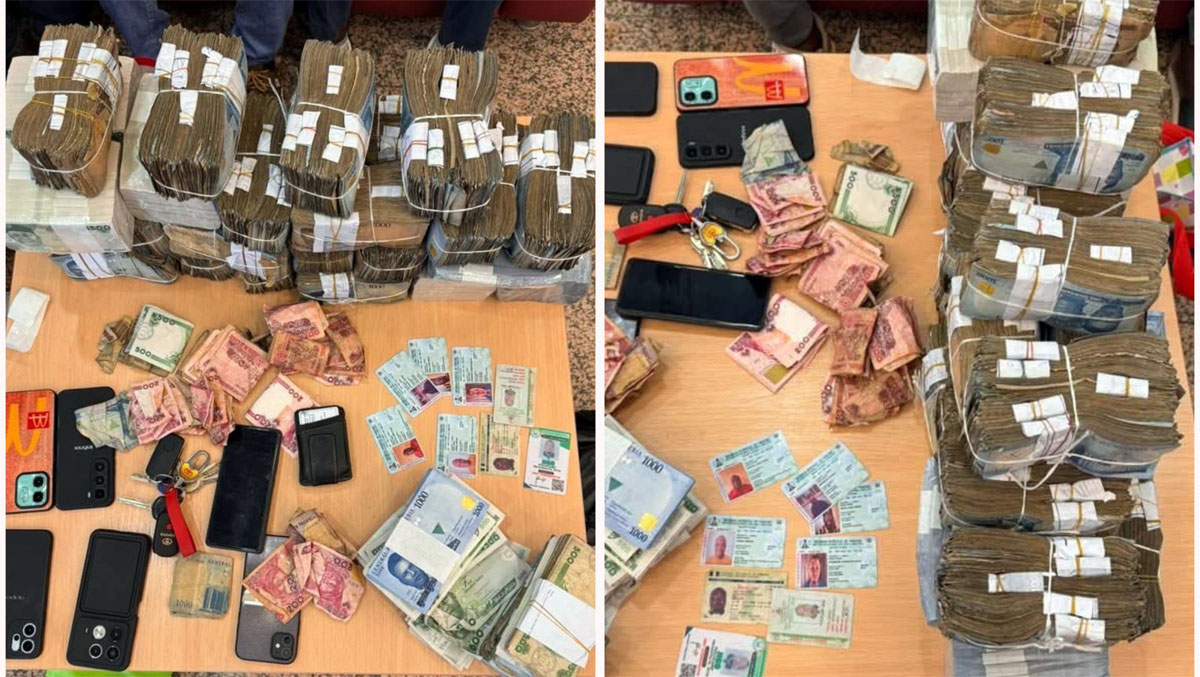
EFCC Nabs 20, Seizes ₦17m Over Vote Buying in FCT Elections
The Economic and Financial Crimes Commission (EFCC) has arrested 20 suspects over alleged vote buying and other electoral offences during Saturday’s Area Council elections in the Federal Capital Territory (FCT).
In a statement posted on its official X (formerly Twitter) handle on Sunday, the anti-graft agency disclosed that its operatives recovered more than ₦17 million in cash from some of the suspects during coordinated enforcement operations across the territory.
According to the EFCC, arrests were recorded in Kwali, Abaji, Gwagwalada and Kuje Area Councils, with offences ranging from vote buying and vote selling to the unlawful possession of large sums of cash near polling units.
The commission revealed that one suspect was intercepted with ₦13.5 million inside a vehicle parked close to a polling unit in Kwali Area Council, raising strong suspicion that the money was intended for voter inducement. Other suspects were arrested with varying amounts of cash allegedly meant to influence voters during the election.
READ ALSO:
- El-Rufai Sues ICPC for ₦1bn Over Alleged Illegal Raid on Abuja Residence
- Relief for Dispatch Riders as FCTA Suspends Permit Levy Enforcement
- No Scrapping of JAMB: FG Dismisses Viral Rumours
The EFCC said the operation was part of its pre-election and election-day deployment aimed at curbing the influence of money in the electoral process and strengthening electoral integrity in the nation’s capital.
“All suspects arrested will be charged to court upon the conclusion of investigations,” the commission stated, reiterating that vote buying and selling are criminal offences under Nigeria’s laws.
The FCT Area Council elections recorded low voter turnout, while allegations of electoral malpractice emerged from the African Democratic Congress (ADC), whose candidates lost in several councils.
Despite the controversy, the All Progressives Congress (APC) dominated the polls, winning five of the six chairmanship seats, while the Peoples Democratic Party (PDP) secured victory in Gwagwalada Area Council.
The EFCC reaffirmed its commitment to free, fair and credible elections, warning politicians, party agents and voters that the commission would continue to deploy operatives to monitor elections and prosecute offenders.
EFCC Nabs 20, Seizes ₦17m Over Vote Buying in FCT Elections
metro
El-Rufai Sues ICPC for ₦1bn Over Alleged Illegal Raid on Abuja Residence
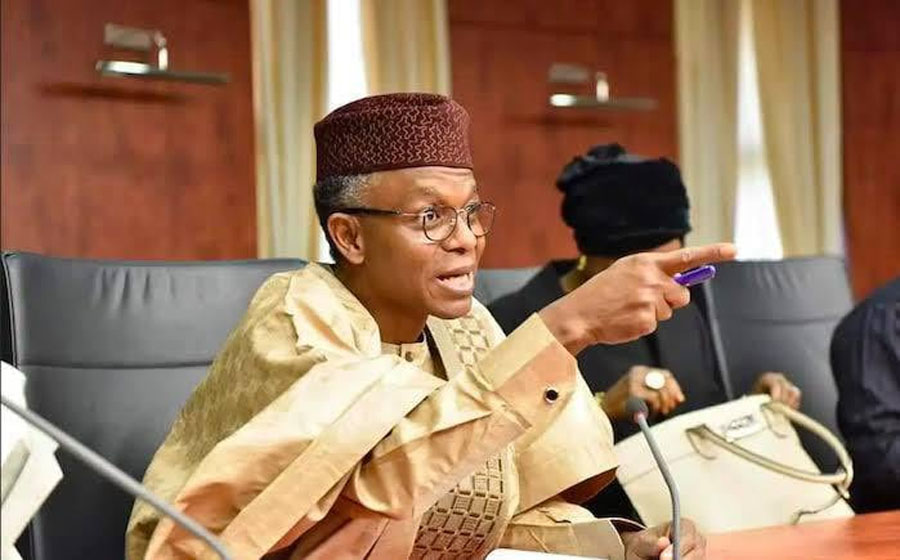
El-Rufai Sues ICPC for ₦1bn Over Alleged Illegal Raid on Abuja Residence
Former Kaduna State Governor, Nasir El-Rufai, has instituted a ₦1 billion fundamental rights enforcement suit against the Independent Corrupt Practices and Other Related Offences Commission (ICPC) over the alleged unlawful invasion and search of his Abuja residence.
In the suit marked FHC/ABJ/CS/345/2026, filed before the Federal High Court, Abuja, El-Rufai is asking the court to invalidate a search warrant issued on February 4 by a Chief Magistrate of the Magistrate’s Court of the FCT, describing it as defective, vague, and unconstitutional.
The former governor, through his legal team led by Oluwole Iyamu, argued that the warrant lacked specificity, contained material drafting and typographical errors, was overbroad, and was issued without probable cause, thereby violating his constitutional right to privacy under Section 37 of the 1999 Constitution (as amended).
El-Rufai named the ICPC, the Chief Magistrate of the FCT Magistrate’s Court, the Inspector-General of Police, and the Attorney-General of the Federation as respondents in the suit.
READ ALSO:
- Relief for Dispatch Riders as FCTA Suspends Permit Levy Enforcement
- No Scrapping of JAMB: FG Dismisses Viral Rumours
- S’Eagles Watch: Lookman, Iwobi, Ndidi Shine Across Europe as Osimhen Misses Out
According to court documents, operatives of the ICPC and Nigeria Police Force allegedly invaded El-Rufai’s residence at House 12, Mambilla Street, Aso Drive, Abuja, on February 19 at about 2:00 p.m., acting under the disputed warrant. He claimed the operation amounted to a gross violation of his fundamental rights, including the right to dignity of the human person, personal liberty, fair hearing, and privacy, as guaranteed under Sections 34, 35, 36, and 37 of the Constitution.
The former governor further urged the court to rule that any evidence obtained during the search is inadmissible, having been procured through an illegal and unconstitutional process. He also sought an injunction restraining the respondents from relying on, using, or tendering any items seized during the operation.
As part of his reliefs, El-Rufai demanded ₦1 billion in damages, broken down into ₦300 million as compensatory damages for psychological trauma and emotional distress, ₦400 million as exemplary damages to deter future misconduct by law enforcement agencies, and ₦300 million as aggravated damages for what he described as the malicious, high-handed, and oppressive conduct of the respondents. He also requested ₦100 million as cost of litigation, covering legal fees and associated expenses.
In his legal arguments, Iyamu maintained that the warrant violated provisions of the Administration of Criminal Justice Act (ACJA), 2015, particularly Sections 143–148, as well as Section 36 of the ICPC Act, 2000. He argued that the warrant failed to clearly describe the items to be seized, was improperly addressed, and lacked the sworn information required to justify its issuance.
An affidavit in support of the application, deposed to by Mohammed Shaba, stated that officers involved in the raid did not submit themselves for search, seized personal documents and electronic devices, and have failed to return the items. He added that the incident caused humiliation, distress, and psychological trauma to the former governor.
The case is expected to test the limits of search-and-seizure powers of anti-graft and law enforcement agencies, as well as reinforce judicial scrutiny over the use of search warrants in high-profile investigations.
El-Rufai Sues ICPC for ₦1bn Over Alleged Illegal Raid on Abuja Residence
-

 Business1 day ago
Business1 day agoDangote Opens Refinery Investment to Nigerians With Public Share Sale Plans
-

 Education2 days ago
Education2 days agoUTME: JAMB Clarifies Position on Hijab During Biometric Capture
-

 Politics1 day ago
Politics1 day agoTinubu Hails Wike as APC Dominates 2026 FCT Area Council Elections
-

 Entertainment3 days ago
Entertainment3 days agoTacha Condemns False Rape Allegations After Mirabel Admits Fabrication
-

 Politics2 days ago
Politics2 days agoADC Defeats APC to Win First Polling Unit in FCT Area Council Election
-

 Entertainment1 day ago
Entertainment1 day agoRegina Daniels Takes Delivery of ₦150m 2026 GAC Trumpchi M8 SUV
-

 Politics1 day ago
Politics1 day agoOpposition Weakens as Another Governor Eyes APC Move
-

 Politics1 day ago
Politics1 day agoFCT Council polls: APC Wins Four Chairmanship Seats as PDP Takes Gwagwalada



